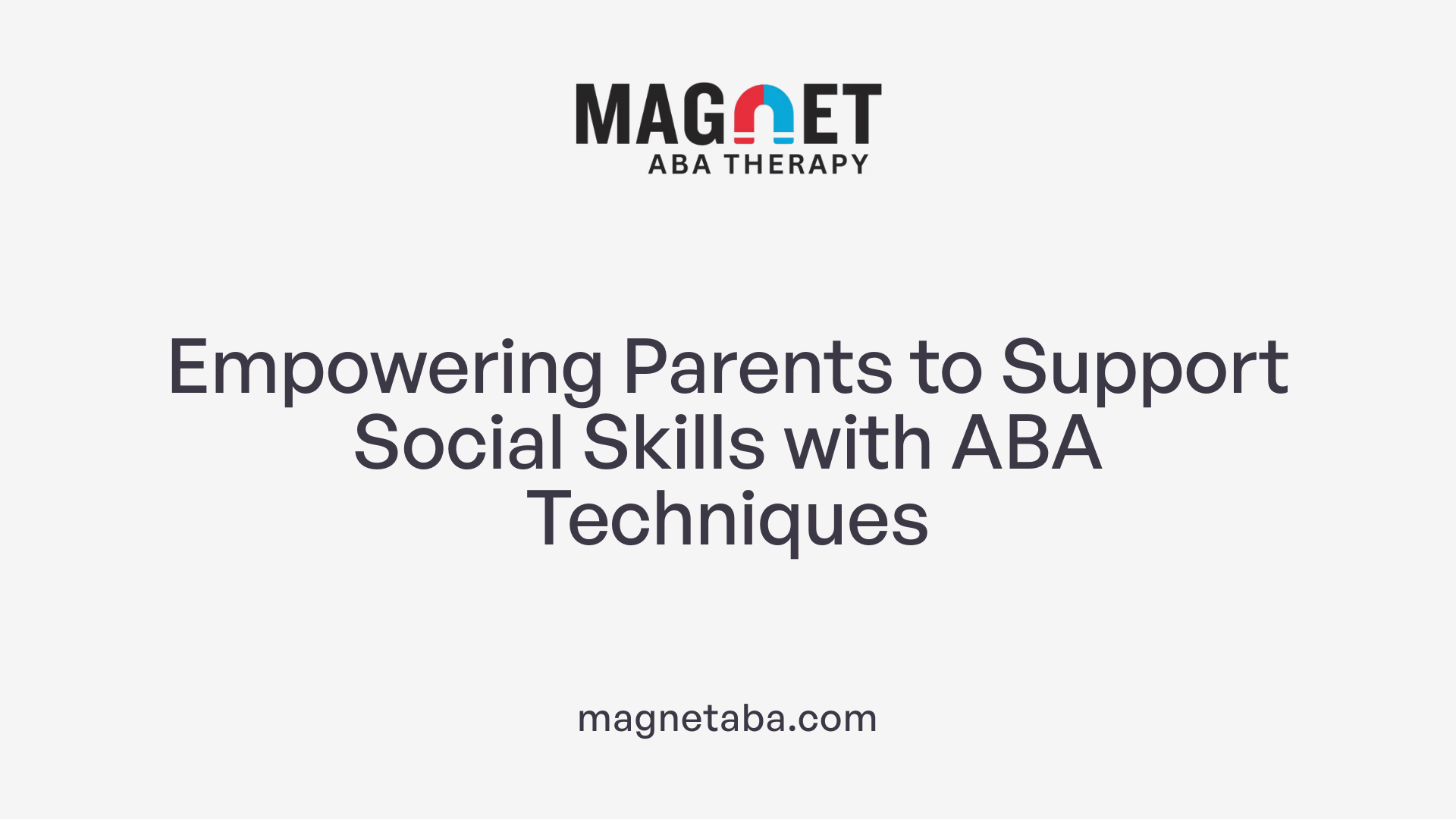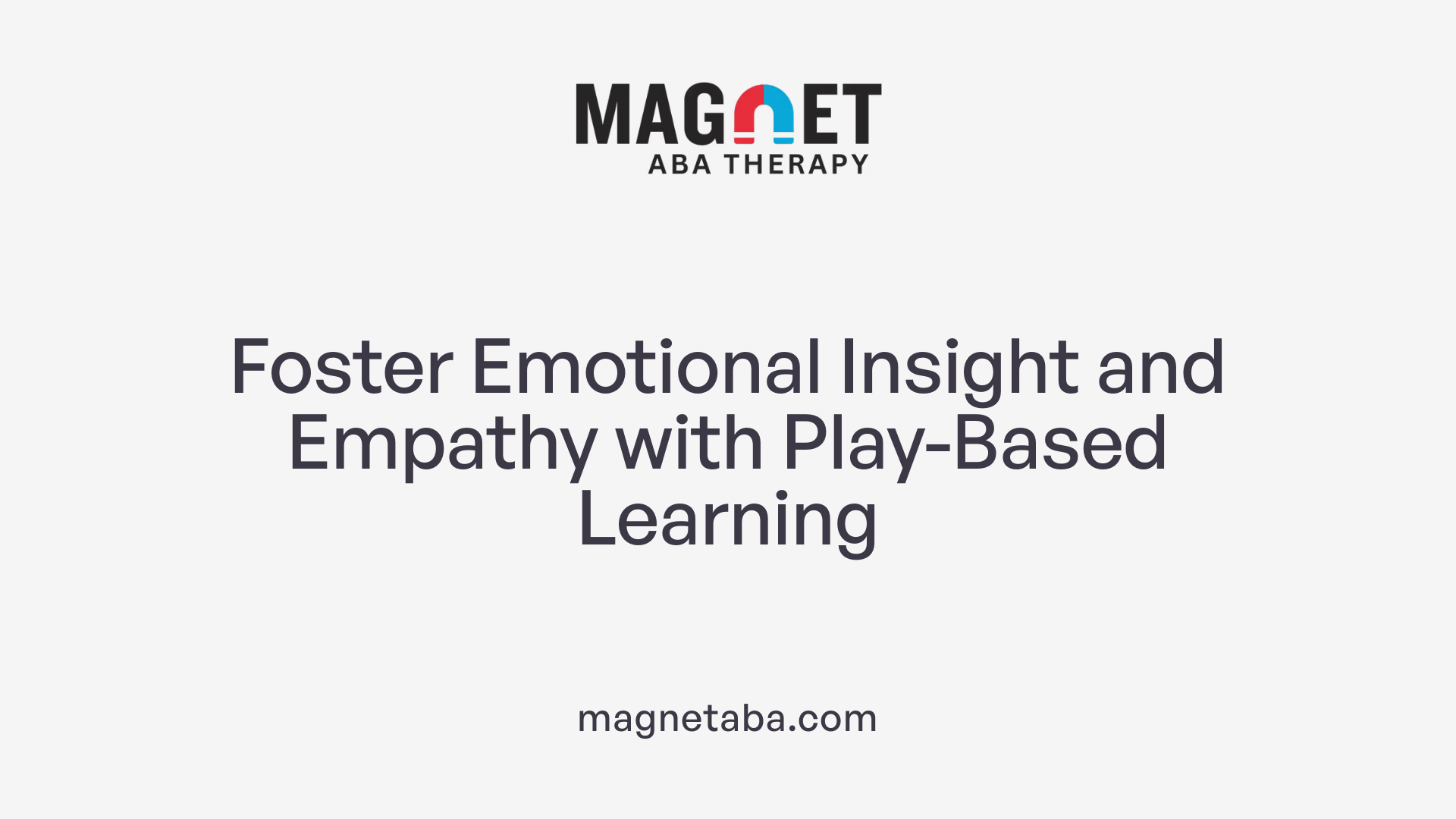Understanding the Critical Role of Play in Autism Support
Supporting children with autism in developing robust social skills and meaningful peer interactions is essential for their overall growth. Applied Behavior Analysis (ABA) presents a structured, evidence-based approach that effectively integrates play into social skill development, providing children with practical tools to engage confidently with others while fostering independence and emotional understanding.
The Importance of Play in ABA Therapy for Social Development

What is the role of play in ABA therapy to improve social and play skills for children with developmental challenges?
Play is a central component of ABA therapy, serving as an effective method for teaching children with developmental challenges, such as autism, essential social, emotional, and communication skills. It provides a natural, motivating environment where children can learn through engaging activities that mimic real-life interactions.
In ABA therapy, various forms of play — including pretend play, object play, and group play — are strategically employed to foster social skills. For example, role-playing helps children practice social scenarios like greeting others or sharing. Turn-taking and cooperative games teach patience and reciprocity, essential for peer interactions.
Incorporating play into therapy not only makes learning fun but also encourages children to participate actively. It allows them to practice social cues, emotional regulation, and communication in a safe space. Moreover, play-based strategies such as storytelling and visual prompts support generalization of skills to everyday settings.
Play also stimulates neuroplasticity—the brain's ability to adapt and reorganize itself—especially in areas related to social understanding and emotional processing. As children repeatedly engage in meaningful play activities, their brain pathways strengthen, leading to improved social comprehension and interaction skills.
Overall, the use of play in ABA therapy promotes motivation, enhances engagement, and fosters critical social behaviors. It ensures that children not only learn these skills but are also able to apply them confidently across different environments, laying a strong foundation for future social development.
Creating Effective Playdate Environments for Children with Autism

How can caregivers plan structured activities for playdates?
Caregivers should select activities that are predictable, engaging, and suited to the child's developmental level. Using visual supports such as schedules, social stories, or picture cards helps set clear expectations and reduces anxiety. Incorporating familiar toys, games, or themed activities that the child enjoys encourages participation. Structured activities like turn-taking games, collaborative building, or pretend play can promote social interaction and cooperation.
What role do visual supports and schedules play in facilitating social interactions?
Visual supports are essential tools that help children understand what to expect during a playdate. Visual schedules break down activities into manageable steps, providing a visual outline that guides behavior and transitions. Social stories can prepare children for specific social scenarios, modeling appropriate responses and emotional understanding. These tools create a predictable environment, making children more comfortable and willing to engage.
How should caregivers select peers for playdates?
Choosing familiar, understanding, and patient peers can significantly enhance the quality of social exchanges. Peers who are enthusiastic and responsive to the child's needs serve as positive role models. Caregivers should consider the child's comfort zone, shared interests, and the peer's ability to follow through with supportive behaviors. Introducing familiar friends or classmates who already have a rapport can increase the likelihood of successful social interactions.
Practical Strategies and Best Practices
| Strategy | Implementation Example | Benefits |
|---|---|---|
| Use visual supports | Create picture schedules and social stories for activities and rules. | Reduces anxiety and clarifies expectations. |
| Start with familiar peers | Arrange playdates with friends who have positive social tendencies and understanding. | Builds confidence and motivation. |
| Keep playdates short | Begin with 30-minute sessions, gradually increasing duration as comfort improves. | Prevents overwhelm and burnout. |
| Reinforce positive behaviors | Use praise, tokens, or preferred activities to reward sharing, turn-taking, and other social skills. | Encourages continued engagement. |
| Prepare in advance | Develop a social engagement plan, select appropriate activities, and discuss expectations beforehand. | Ensures smoother interactions. |
| Monitor and adapt | Observe behaviors and progress; adjust activities and supports accordingly. | Improves intervention outcomes. |
Final Tips for Success
Caregivers should plan playdates that are relaxing and fun, making use of visual tools to create predictability and comfort. Selecting familiar peers who are understanding and supportive enhances the child's social experience. Setting clear expectations, having an emergency plan, and celebrating successes help foster positive and meaningful peer interactions.
How ABA Supports Social Skills Development in Playdates

How does ABA therapy support the development of social skills and peer interactions during playdates for children with autism?
Applied Behavior Analysis (ABA) therapy plays a vital role in helping children with autism improve their social skills and peer interactions during playdates. The approach uses structured teaching methods, such as role-playing, social stories, and video modeling, to teach important social behaviors like turn-taking, joint attention, and understanding emotions.
These methods break down complex social skills into manageable steps, making them easier for children to learn and practice. For example, role-playing can simulate real-life social situations, allowing children to rehearse responses in a safe environment.
Positive reinforcement techniques are fundamental in ABA. When a child successfully demonstrates a social skill, they receive praise or tangible rewards, which motivates continued engagement and learning. This reinforcement encourages children to participate in social interactions more willingly.
Both group and individual ABA sessions are used to teach and reinforce social skills. In individual sessions, therapists can focus on personalized goals, while group settings provide natural opportunities for peer interaction and social practice. These settings help children learn to navigate peer dynamics, develop communication skills, and build friendships.
Activities are tailored to each child's developmental level and needs, ensuring that skills are learned effectively. Practicing these skills across different environments, including home, school, and community, helps children generalize their new behaviors, making their social interactions more natural and effective.
Overall, ABA therapy combines evidence-based strategies to enhance social understanding, improve peer interactions, and foster meaningful connections during playdates. By systematically teaching, reinforcing, and practicing social skills, children with autism can develop the confidence and competence needed for successful peer relationships.
Supporting Parents in ABA-Driven Social Skill Development

How can parents support social play and peer interactions in children with autism using ABA techniques?
Parents play a crucial role in developing their child's social skills through ABA principles. They can actively support social play and peer interactions by incorporating structured activities that focus on turn-taking, sharing, and cooperation. For example, role-playing scenarios and social stories help children understand social expectations and appropriate responses.
Reinforcement is vital in motivating children. Praising and rewarding positive social behaviors encourages children to repeat these actions and build confidence. Visual supports such as picture schedules, video modeling, and prompts can clarify social cues and emotional expressions, aiding children in understanding what is expected during interactions.
Facilitating opportunities for peer engagement is also essential. Parents can organize playdates and encourage participation in social groups, always modeling respectful behavior and providing consistent reinforcement for positive interactions.
Collaborating with therapists ensures that ABA techniques are tailored to the child's specific needs. Practicing these strategies regularly at home helps children generalize skills across environments, fostering ongoing social growth.
By actively supporting their child's social development through these ABA-informed methods, parents can help children with autism improve their communication, emotional recognition, and peer relationships, setting a foundation for successful social interactions in the future.
Research-Based Approaches to Peer Interaction During Playdates
What are effective, research-based approaches to fostering positive peer interactions during playdates for children with autism?
Fostering positive social interactions during playdates involves several strategies grounded in research. Implementing structured routines and clear social scripts provides children with predictable guidance, helping them understand expected behaviors and communication methods. Visual supports, such as visual schedules, cue cards, or social stories, further assist children in navigating social scenarios comfortably.
Peer-mediated interventions (PMIs) are among the most effective methods. In PMIs, typically developing peers are trained to serve as social models, promoting naturalistic interactions and encouraging children with autism to initiate and respond to social cues. Studies have shown that PMIs significantly increase social initiations, reciprocal exchanges, and peer acceptance.
The integration of technology also plays a valuable role. Devices like tablets and touchscreens can be used for collaborative games, social stories, and video modeling, which visually depict social skills and situations. These technological tools make social learning engaging and accessible, especially in virtual or remote settings.
Adult guidance remains vital. Coaches or therapists can support playdates by providing real-time prompts, scaffolding social exchanges, and helping children navigate conflicts or misunderstandings. This support can be delivered face-to-face or through telehealth supervision, especially useful during times when in-person interactions are limited.
Scheduling regular playdates and involving parents actively enhances consistency and opportunities for skill reinforcement. Parent-led, telehealth-supported programs allow children to practice social skills in familiar environments while receiving professional guidance.
Below is a summary table highlighting prominent strategies:
| Strategy | Description | Effectiveness Highlights |
|---|---|---|
| Structured routines and scripts | Pre-planned activities and predictable phrases | Reduce anxiety and improve behavior |
| Peer-mediated interventions | Peers trained to model and encourage social behaviors | Increase social initiations and responses |
| Visual supports | Schedules, cue cards, social stories | Enhance understanding and predictability |
| Use of technology | Tablets, social apps, virtual environments | Promote engagement and cooperative play |
| Adult coaching/support | Guidance during activities, prompts, and feedback | Builds confidence and manages behavior |
Monitoring progress through data collection helps identify what strategies work best for each child. Adjustments can then be made to optimize social engagement outcomes.
In summary, combining structured routines, peer involvement, visual supports, technological aids, and adult supervision creates a comprehensive framework. These evidence-based approaches foster meaningful, lasting peer relationships for children with autism during playdates, whether in person or virtual.
Incorporating Play-Based ABA in Various Settings
Where can play-based ABA therapy be effectively implemented to support social skills in children with autism?
Play-based ABA therapy is highly adaptable and can be delivered across a variety of environments to maximize social skill development for children with autism.
In the home setting, parents and caregivers can tailor activities to the child's interests and daily routines. This personalized approach helps reinforce skills such as sharing, turn-taking, and emotional expression through everyday play and interactions. Home-based programs offer the advantage of consistency and close family involvement, making it easier to monitor progress and adapt strategies as needed.
In schools, ABA therapy programs are integrated into the classroom environment, providing children with rich opportunities to practice social behaviors alongside classmates. Teachers and therapists work collaboratively to create structured activities, social stories, and peer-mediated interventions. These foster peer relationships and support skill generalization to a broader social context.
Community spaces like parks, neighborhood centers, and recreational areas also serve as effective platforms. Such environments promote naturalistic interactions and participation in group activities like sports, games, and cooperative play, which are essential for real-world social navigation.
The versatility of play-based ABA allows interventions to be carefully customized to each setting, enhancing accessibility, engagement, and relevance for the child. Strategies such as visual schedules, social stories, and peer modeling can be adapted to any environment. This approach encourages children to generalize social skills across different contexts, boosting confidence and social competence in daily life.
| Setting | Opportunities | Tailoring Strategies | Benefits |
|---|---|---|---|
| Home | Family interaction, individual play | Visual supports, parent training, individualized routines | Consistency, reinforcement, family involvement |
| School | Classroom activities, peer interactions | Collaboration with teachers, social stories, peer-mediated programs | Peer relationships, skill generalization |
| Community | Parks, recreational centers | Natural play opportunities, group games | Real-world social navigation, independence |
By utilizing a range of environments, play-based ABA provides a comprehensive framework that supports children with autism in developing vital social skills applicable across all areas of their lives.
Supporting Sensory-Friendly Play and Self-Regulation
Children with sensory sensitivities often find social play and peer interactions overwhelming, but ABA techniques provide effective support to help them participate more comfortably.
One approach is the implementation of sensory diets, which involve scheduled activities tailored to a child's unique sensory needs. These activities help regulate sensory input, leading to improved focus and reduced anxiety during play. For example, gentle swinging or weighted blanket use can calm a child before social engagement.
Creating sensory-friendly environments is another significant strategy. This includes reducing loud noises, bright or flashing lights, and providing calming items such as noise-canceling headphones, textured toys, or soft lighting. By minimizing overstimulation, children feel more secure and can engage more fully in social play.
Teaching children coping strategies is essential for self-regulation. Techniques like deep pressure touch, visual calming tools, or controlled breathing exercises empower children to manage sensory overloads. These skills can be reinforced through visual supports and social stories, which prepare children for sensory-rich activities.
Incorporating these methods into playdates allows children to enjoy social interactions without feeling overwhelmed. Visual schedules and cues can also help children anticipate sensory input and understand how to respond appropriately.
Overall, ABA's systematic use of sensory adaptations supports children's participation by fostering confidence and reducing stress during social activities. With targeted interventions, children develop resilience and skills to navigate sensory challenges, making social play a positive and inclusive experience.
Using Play to Develop Emotional Understanding and Empathy

How can play activities be used to improve emotional understanding and empathy in children with autism?
Play provides a natural and motivating context for children to learn about emotions and develop empathy. Through carefully designed activities such as role-playing, social stories, and visual supports, children can practice recognizing and understanding various feelings. For example, role-playing different social situations allows children to experience and respond to facial expressions and emotional cues, fostering a better grasp of others' emotions.
Visual tools like emotion cards or facial expression charts are instrumental in helping children identify feelings. By matching expressions to emotions or discussing the situation, children learn to interpret social cues and develop emotional literacy. Games that emphasize sharing, turn-taking, and collaboration promote perspective-taking and understanding others' viewpoints, which are vital aspects of empathy.
In the context of ABA therapy, these playful strategies are integrated seamlessly to create engaging learning experiences. They help children recognize their own emotions and those of peers, regulate reactions, and form meaningful social bonds. Through consistent practice, children build the skills necessary for compassionate social interactions, making play an essential element in emotional and social development.
Fostering Lasting Social Connections through Play and ABA
Supporting children with autism in developing social skills and meaningful peer relationships requires a comprehensive approach that leverages the power of play within ABA frameworks. Establishing structured, predictably enjoyable play-based activities—tailored to each child's unique needs—encourages natural social interactions and communication. Caregivers and practitioners can enhance these efforts by using visual supports, peer-mediated interventions, and positive reinforcement strategies. Transitioning skills from therapy into real-world settings like homes, schools, and community spaces ensures these behaviors are generalized and sustained over time. Through deliberate planning, ongoing data collection, and active family involvement, children can build deeper friendships, participate confidently in group activities, and foster resilience and emotional understanding. Ultimately, integrating play into ABA not only teaches vital social skills but also contributes to joyful, fulfilling peer interactions that lay the foundation for lifelong social success.
References
- How Can I Structure Playdates for Success?
- ABA Therapy for Enhancing Social Skills in Children with Autism
- ABA Therapy for Kids: Helping with Friendships and Social Skills
- Social Skills: Helping Children Build Meaningful Connections
- The Role of Play in ABA Therapy: Making Therapy Fun
- Building Social Skills Through Play Dates
- ABA Therapy for Enhancing Social Skills in Children with Autism
- Harnessing ABA Therapy for Social Skills Development in Autism
- The Role of Family in ABA Therapy: Tips for Parents
- Play Therapy For Autism: What Parents Need to Know - Blue ABA











